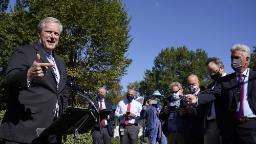
This is the moment when the White House’s lack of credibility becomes an immediate crisis

Seeking to calm just those fears, White House chief of staff Mark Meadows answered a handful of reporters’ questions Friday. Meadows’ main message was to assure the public that Trump, while he had “mild” symptoms, was still the same old guy.
“He’s in the residence now, and in a true fashion he’s probably critiquing the way that I’m answering these questions,” Meadows said. He also noted that Trump’s first questions to him this morning were about the economy, the jobs report and the state of economic stimulus talks on Capitol Hill.
Here’s the problem: We have no way of actually knowing if Meadows is telling the truth. About Trump’s health, about what the White House knew, and when, about senior adviser Hope Hicks’ positive test on Thursday morning — about any of it.
Why? Because this is a White House that, from the moment Trump became a presidential candidate, has made the erosion of truth and facts its central mission. According to a count kept by the Washington Post’s Fact Checker blog, Trump had made more than 20,000 false or misleading claims as of July 13. And a look at CNN’s “Facts First” page produces story after story of Trump exaggerating, misleading and outright lying on a daily basis.
In the days after his 2016 election victory, Trump claimed, without proof, that 3 to 5 million illegal votes had been cast. He pressured top aides to insist, despite visual evidence to the contrary, that his inauguration had been the best attended ever. He claimed, citing no evidence, that then President Barack Obama had ordered a wiretapping operation against him during the campaign.
And that was all in the first three months after he won!
What’s remarkable is that Trump’s willingness to exaggerate, mislead and flat-out lie has increased the longer he has been in the White House. And reached breakneck speed as the election approaches. CNN fact checker Daniel Dale said that Trump launched “an avalanche of lies” in the first general debate against former Vice President Joe Biden on Tuesday.
Trump himself has openly called on his supporters to trust only what he says. “Stick with us. Don’t believe the crap you see from these people, the fake news,” he told a group of veterans in 2018. “What you’re seeing and what you’re reading is not what’s happening.”
All of this has an effect. A big one. People don’t know who to trust. Or whether they can trust anyone. And in the absence of a shared understanding of established facts, misinformation runs wild. Add the vectoring capacity of social media sharing — and the country’s heightened willingness to believe any conspiracy theory that fits their preferred political views — and you have a recipe for chaos.
Trump’s active undermining of truth has caused its own boomerang effect in which a large majority of people have simply stopped believing anything he says.
An ABC-Ipsos poll released in mid-September showed that almost seven in 10 Americans (68%) did not trust what Trump said about the coronavirus pandemic. A Pew poll in June showed similar results; just 30% said Trump and his White House got the facts about Covid-19 right most or all of the time.
That’s bad at any time. But it’s far worse when we are in a moment of acute crisis. Trump’s positive test unsettles a country already on edge because of the unknown arc of the coronavirus going into the fall — not to mention the coming election and Trump’s repeated attempts to undermine the result.
You reap what you sow — and Trump has sown discord and distrust.
Unfortunately, the greatest impact of the lack of credibility from the President and the White House is on the average American. In moments of crisis, people — whatever their partisan leanings — look to our elected leaders for leadership. That includes bringing calm and reassurance to a frightened public.
That can’t happen in this White House because so much of what the President and his top aides have said — about coronavirus among many, many other topics — has been either misleading or outright false.
That’s a loss for all of us. And a reminder that actions (and elections) have consequences.














